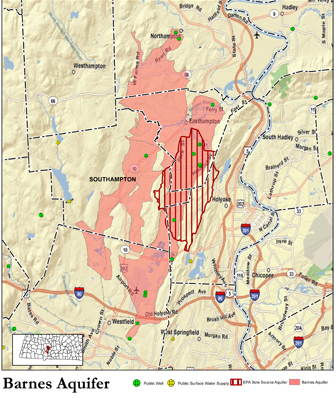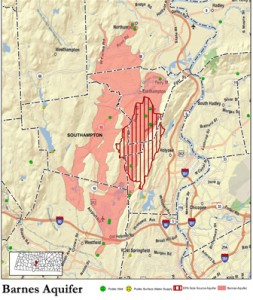WESTFIELD—The city’s water officials will be visiting Cape Cod soon, but not for vacation. Instead, they’re hoping to find a way to maximize the Cape’s efforts to solve the water contamination problem in Westfield.
City officials said that they are planning a visit out to the area to try and learn more about how the community of Barnstable and others have been dealing with their own water contamination. The contamination out there is similar to Westfield’s in several ways, and officials want to be able to use the Cape’s experience to help out residents back home.
“We are looking to set up a visit with the Cape to see what they have going on and to learn what we can from their successes and build on their successes,” Westfield water systems engineer Heather Miller, said.
A large portion of the Cape’s water supply comes from the same type of source as Westfield, an aquifer, and the Cape Cod aquifer has seen a contamination from perfluorinated chemicals (PFCs), just like Westfield, suspected from a similar source, the Cape Cod Joint Air Base and aqueous firefighting foam (AFFF) that was used on the base, as well as at a nearby firefighting academy.
The town of Barnstable has been dealing with this contamination problem and has treated it similarly to what Westfield officials intend to do. Their treatment has been by passing water through large granular-activated carbon filters (GACFs), which catches contaminants and produces cleaner water for residents.
However, the Cape’s efforts have been mixed, which is where Westfield can learn most from.
Miller said that Westfield is currently in the process of getting bench scale testing done for the water of the contaminated wells, which is something officials out on the Cape did not do. The way of getting the water by the way, will not put any contaminated water into the drinking water supply of Westfield, Miller said.
“Because of the emergency nature of the situation at the Cape they didn’t conduct those types of tests and that’s definitely something we are trying to improve on their process,” she said.
“We’ll get water from the [offline] wells and send it to a lab and test it to get everything in the water and get a bench scale—a range scale—and get different treatment configurations to help us decide what we will do for our treatment plant,” Miller said.
The bench scale will give the city a chance to see what additional pretreatment options they may need before putting the water through the GACFs. This is because while the GACFs are great at filtering water, they can wear down and become less effective as larger chemicals, such as metals, and other contaminants are filtered through the carbon’s porousness. When officials at the Cape did not do this testing, they did not find those larger chemicals, which has reduced the life of their carbon filters. Westfield hopes to be able to filter out the larger contaminants before the water reaches the GACFs.
There have also been other concerns with Cape Cod water as well, which is part of the quicker breakdown of the GACFs there. In addition to PFC contamination, the home septic systems have reduced effectiveness, so additional contaminants, such as nitrogen, phosphorous and residual medication that is typically found in people’s urine have found their way into the Cape Cod aquifer. Additionally, the Cape has seen issues with algae in their water, as well.
And while Westfield does have additional contaminants in the water, they are not at the level that the Cape is. Plus, Westfield has more than just the Barnes aquifer as a water supply; Cape Cod almost exclusively has the Cape Cod aquifer.
This doesn’t mean that Westfield officials are working any less quickly, though. They are moving forward with the project and are hopeful that it can be done relatively soon, pending permits, test results and site planning.
“We are working as quickly as we can, we are targeting this year,” Miller said.
Also, according to city officials, the water is still safe to consume while they await the completion of the GACFs.



